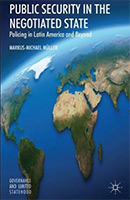Public Security in the Negotiated State:
Policing in Latin America and Beyond

Author: Markus-Michael Muller
Publisher: New York, NY: Palgrave Macmillan, 2012. 269p.
Reviewer: Sam Bieler | September 2012
When global security is discussed, “policing” is often referenced in popular literature as a uniform enterprise that is similarly implemented across the globe. Public Security in the Negotiated State: Policing in Latin America and Beyond offers an excellent counterpoint to conventional narratives of policing. With a focus on interdisciplinary research that blends history, political science and criminology, author Markus-Michael Muller offers a readable and comprehensive look at the circumstances and conditions that gave rise to Mexico City’s brand of policing, and explains the implications this has for the emphasis on rule of law as a global phenomenon.
Muller begins with current definitions of policing, pushing back against conventional narratives to set the stage for his research. Noting that police have never been the sole provider of security within the state, Muller goes on to suggest that the unique role of police in the state is not security but visibility, and through that, representatives of the social contract between the state and the governed. Based on this, Mueller offers a study of police policies in Mexico City. Starting with a history of policing in Mexico and its roots in the colonial administration of the Spanish, Muller discusses the attributes of the Mexican state and how these features created a policing system in which various power centers in Mexican culture use their monetary and political leverage to receive different varieties of police service. These findings are buttressed by a carefully selected set of interdisciplinary observations.
Interdisciplinary methodology is a key strength of this book. History, political science and criminology are mended to provide a comprehensive picture of Mexico City policy at the micro and macro level. History provides the context for a detailed overview of the political and organizational structures of police in Mexico City as well as their interaction with the population while political science and criminology provide the lens through which the neighborhoods of Coyoacan and Iztapalapa are described. Muller supports his narrative with primary source interviews of officers and residents, providing a strong basis for a further expansion of the narrative.
Public Security in the Negotiated State ends by expanding the discussion of policing in the negotiated state into the global theater. Muller argues that the model of policing that is considered conventional in the modern world is a European creation while the Latin American model of policing negotiated through various power structures is a more prevalent model of policing than previously thought, crafted out of the interaction of colonial institutions with native populations. This move into broader themes of policing and international development lacks the detailed support for the conclusions reached about policing in Mexico. The book would have benefited from a more detailed explanation on the link between colonialism and policing if the author hoped to make a strong case for the connection between policing in the negotiated state and colonialism. That said, Public Security in the Negotiated State offers a nuanced look at public security that scholars of policing and Latin American politics will find valuable.
Sam Bieler is a Research Associate at the Urban Institute.


